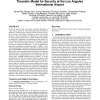Free Online Productivity Tools
i2Speak
i2Symbol
i2OCR
iTex2Img
iWeb2Print
iWeb2Shot
i2Type
iPdf2Split
iPdf2Merge
i2Bopomofo
i2Arabic
i2Style
i2Image
i2PDF
iLatex2Rtf
Sci2ools
101
Voted
ATAL
2008
Springer
2008
Springer
Deployed ARMOR protection: the application of a game theoretic model for security at the Los Angeles International Airport
Security at major locations of economic or political importance is a key concern around the world, particularly given the threat of terrorism. Limited security resources prevent full security coverage at all times, which allows adversaries to observe and exploit patterns in selective patrolling or monitoring, e.g. they can plan an attack avoiding existing patrols. Hence, randomized patrolling or monitoring is important, but randomization must provide distinct weights to different actions based on their complex costs and benefits. To this end, this paper describes a promising transition of the latest in multi-agent algorithms
Agent Called Armor | ATAL 2008 | Bayesian Stackelberg Games | Intelligent Agents | Overall Desired Randomization |
Related Content
| Added | 12 Oct 2010 |
| Updated | 12 Oct 2010 |
| Type | Conference |
| Year | 2008 |
| Where | ATAL |
| Authors | James Pita, Manish Jain, Janusz Marecki, Fernando Ordóñez, Christopher Portway, Milind Tambe, Craig Western, Praveen Paruchuri, Sarit Kraus |
Comments (0)

